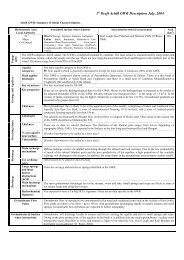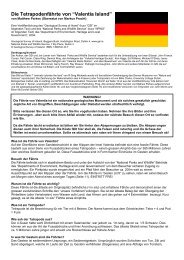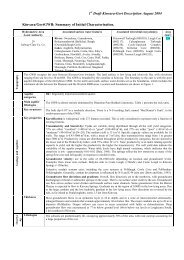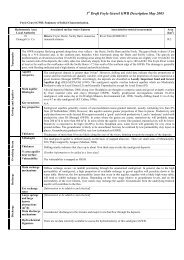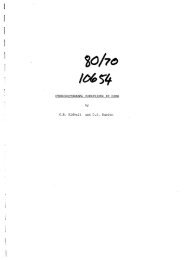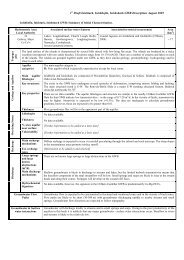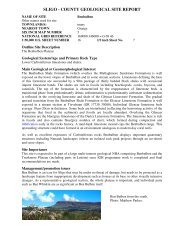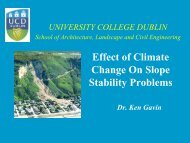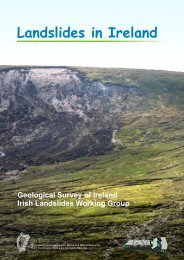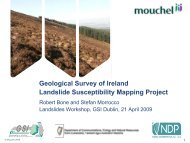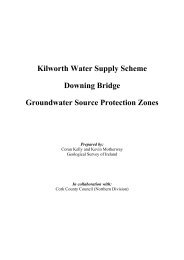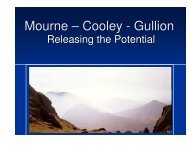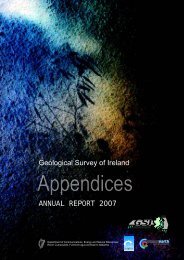7.2 Carboniferous Cliff Lines (Co Fermanagh)Landslides occur along the cliff lines at Magho [H075 580], Belmore Mountain [H154 415], and CuilcaghMountain [H110 293]. In most cases these cliffs are capped by hard limes<strong>to</strong>ne strata (Dartry Limes<strong>to</strong>neFormation, Carboniferous) and interbedded limes<strong>to</strong>nes/muds<strong>to</strong>nes (Glencar Limes<strong>to</strong>ne Formation), which overlieless competent muds<strong>to</strong>ne-dominant formations (Benbulben Muds<strong>to</strong>ne Formation and Bundoran Shale Formation).Glacial erosion caused oversteepening <strong>of</strong> the Fermanagh cliff resulting in rotational landsliding and theaccumulation <strong>of</strong> block screes. The major rotational landslips are now mainly dormant although smaller scalesecondary slips still occur. At Magho, for example, large rotational slips and secondary slumps continue <strong>to</strong>cause instability problems and affect the Enniskillen <strong>to</strong> Belleek road (A46) close <strong>to</strong> the southern shore <strong>of</strong> LowerLough Erne. At Cuilcagh Mountain, on the Co. Fermanagh/Co. Leitrim border, where massive blocky sands<strong>to</strong>ne(Lackagh Sands<strong>to</strong>ne Formation & Briscloonagh Sands<strong>to</strong>ne Formation) overlies a muds<strong>to</strong>ne-dominated succession(Dergvone Shale Formation), erosion and oversteepening <strong>of</strong> the cliff-face has resulted in landslips and <strong>to</strong>pplingleading <strong>to</strong> an accumulation <strong>of</strong> a large block scree.7.3 Peat Failure (Bog Bursts and Peat Slides)Peat slides and bog bursts are characteristically rapid mass movements that occur in areas <strong>of</strong> upland peat andare triggered by heavy and/or prolonged rain.Bog bursts usually involve rupture or tearing <strong>of</strong> the peat layer with liquefied peat <strong>of</strong>ten being expelled along themargin <strong>of</strong> the peat mass or through tears on the peat surface (Warbur<strong>to</strong>n et al., 2004).Peat slides by contrast occur as slab-like shallow translational failures that involve shearing at or just abovethe interface between the peat and an underlying low permeability mineral substrate.In Northern <strong>Ireland</strong>, bog failures have been documented in several areas:Co. Antrim: Slieve-an-Orra Hills (Tomlinson et al., 1982).Glendun (Colhoun et al., 1965).Sherry Hill (Wilson et al., 1993).Co. Fermanagh: Cuilcagh Area (Dykes and Kirk, 2001).Carrowmaculla (Tomlinson, 1981).On Cuilcagh Mountain, where relatively thin peat rests on modest slope angles, bog bursts appear <strong>to</strong> havebeen triggered by a combination <strong>of</strong> man-made alterations <strong>to</strong> the drainage regime induced by peat cutting andheavy rainfall.Peat Failure MechanismsThe mechanisms that lead <strong>to</strong> mass movement <strong>of</strong> peat are not yet fully unders<strong>to</strong>od, however a series <strong>of</strong> commonfac<strong>to</strong>rs have been identified (Tomlinson et al., 1982):1. The peat overlies a low permeability or impervious clay-rich mineral substrate.2. There is a convex slope or a slope with a break <strong>of</strong> slope at its head.3. Proximity <strong>to</strong> local drainage (seeps, groundwater flow, pipes, streams)4. Connectivity between surface drainage and the peat/impervious layer interface.Much <strong>of</strong> the upland peat cover in Northern <strong>Ireland</strong> has been drained and removed either completely or partiallyfor use as fuel, horticultural growing medium, or as part <strong>of</strong> general land improvements and reclamation. Theremaining intact areas <strong>of</strong> peat are increasingly valued as habitats worthy <strong>of</strong> conservation and, in some cases,have been designated by the Environment & Heritage Service <strong>of</strong> Northern <strong>Ireland</strong> as Areas <strong>of</strong> Special ScientificInterest (ASSI) eg. Cuilcagh Mountain, Co Fermanagh (ASSI 069).Reported bog burst and peat slide events in Northern <strong>Ireland</strong> have, <strong>to</strong> date, generally been <strong>of</strong> modest proportionsand have occurred in relatively remote locations away from human habitation. The recent catastrophic bogslide events at Derrybrien (Co. Galway) and Polla<strong>to</strong>mish (Co. Mayo) have however heightened awareness <strong>of</strong>the potential for bog failure in Northern <strong>Ireland</strong>.Coincidentally Northern <strong>Ireland</strong> has also recently experienced a growth in development <strong>of</strong> upland wind farms(with several more in the pipeline). In most cases these developments have been located in areas where full orpartial peat cover, moderate <strong>to</strong> steep slopes, and high average annual rainfall can potentially increase the risk76
<strong>of</strong> peat slides. To avoid this, GSNI now routinely advises the Planning Service <strong>to</strong> ensure that the EnvironmentalImpact Assessments required <strong>to</strong> accompany applications for such developments consider peat slide risk andinclude information regarding peat depth and slope stability assessments.7.4 Land Use Planning and Development Control in LandslideSusceptible AreasThe system for land use planning in Northern <strong>Ireland</strong> differs from those currently operating elsewhere in theUnited Kingdom and the Republic <strong>of</strong> <strong>Ireland</strong>.In Northern <strong>Ireland</strong>, planning and development control is a centralised function and is primarily the responsibility<strong>of</strong> the Planning Service, an agency <strong>of</strong> the Department <strong>of</strong> the Environment. The Planning Service develops andimplements Government planning policies and development plans in Northern <strong>Ireland</strong>.The Planning Service’s website (http://www.planningni.gov.uk/) summarises the role <strong>of</strong> the agency as follows:-“The planning system exists <strong>to</strong> regulate the development and the use <strong>of</strong> land in the public interest. TheDepartment’s functions, in relation <strong>to</strong> planning, are set out in the Planning (Northern <strong>Ireland</strong>) Order 1991. Therole <strong>of</strong> the Agency is <strong>to</strong> administer most <strong>of</strong> these functions. All planning decisions up until 14 Oc<strong>to</strong>ber 2002were taken under the authority <strong>of</strong> the Minister <strong>of</strong> the Department <strong>of</strong> Environment. Following the suspension <strong>of</strong>the Northern <strong>Ireland</strong> Assembly the Parliamentary Under Secretary <strong>of</strong> State at the Northern <strong>Ireland</strong> Office hasexercised that authority.”The GSNI acts as one <strong>of</strong> the Planning Service’s statu<strong>to</strong>ry consultees and provides advice on a range <strong>of</strong>geologically related planning matters. Consultation takes place at various stages in the planning process,including planning policy development, regional and area planning, and development control.GSNI maps landslides and areas <strong>of</strong> ground instability in the course <strong>of</strong> its systematic geological resurveyprogramme in Northern <strong>Ireland</strong>, and landslides are represented on the published 1:50,000 scale geologicalmap series. GSNI is therefore uniquely placed <strong>to</strong> advise the Planning Service and identify potential landslidehazards which are potentially areas <strong>of</strong> planning constraint.The Planning (Environmental Impact Assessment) Regulations (Northern <strong>Ireland</strong>) 1999 require applications forcertain categories <strong>of</strong> development <strong>to</strong> undergo Environmental Impact Assessment and be accompanied by anEnvironmental Statement. GSNI provides the Planning Service and the developer with generic, (or sometimessite specific) advice on geological fac<strong>to</strong>rs, including landslide risks that are likely <strong>to</strong> impact on or be impactedby a particular development.Many <strong>of</strong> the landslides in Northern <strong>Ireland</strong> occur in remote areas or are <strong>of</strong> such minor extent that they pose nosignificant risk <strong>to</strong> the safety <strong>of</strong> humans, lives<strong>to</strong>ck, or infrastructure. Where landslides or ground instability doconstitute a significant constraint <strong>to</strong> surface land use they need <strong>to</strong> be brought <strong>to</strong> the attention <strong>of</strong> developers andplanning authorities alike.The biggest threat <strong>to</strong> the stability <strong>of</strong> a landslide prone site arises through ignorance <strong>of</strong> the risks <strong>of</strong> unregulateddevelopment that may undermine the <strong>to</strong>e <strong>of</strong> a landslide, overload unstable ground, or radically alter existingground drainage patterns. Detailed knowledge <strong>of</strong> the risk associated with landslides coupled with carefulmanagement <strong>of</strong> drainage, use <strong>of</strong> retaining walls, slope-grading etc., can <strong>of</strong>ten minimise the effects <strong>of</strong> furthermovement on existing dwellings and infrastructure.“A Planning Strategy for Rural Northern <strong>Ireland</strong>” (Department <strong>of</strong> the Environment for Northern <strong>Ireland</strong>, 1993)outlines a policy for restricting development in unstable areas (PSU10). A more detailed Planning PolicyStatement along the lines <strong>of</strong> PPG 14 “Development on Unstable Ground”, currently in operation in England andWales, could be a useful resource <strong>to</strong> support planners and developers in Northern <strong>Ireland</strong>.7.5 Some Thoughts about the FutureIt is difficult <strong>to</strong> predict if and how the current levels and types <strong>of</strong> landslides and slope instability experienced inNorthern <strong>Ireland</strong> will be affected by predicted changes in global climate. Existing slopes, both natural andartificial, (eg. railway and road embankments/cuttings) may also be vulnerable <strong>to</strong> future climatic changes.Current predictions for climate change in Northern <strong>Ireland</strong> include: overall warming with rises in precipitationand potential evapotranspiration. Winter gales are predicted <strong>to</strong> decrease in frequency but increase in severity.77
- Page 1 and 2:
Landslides in IrelandGeological Sur
- Page 3 and 4:
LANDSLIDESinIRELANDEditorRonnie Cre
- Page 5 and 6:
CONTENTSPreface ...................
- Page 7 and 8:
Fig. 4.3 Forces caused by water in
- Page 9 and 10:
PREFACEUntil recently Ireland has b
- Page 11 and 12:
een very important in populating th
- Page 13 and 14:
involves a report on the current st
- Page 15 and 16:
Main Objectives• Increase public/
- Page 17 and 18:
1. INTRODUCTIONRonnie Creighton1.1
- Page 19:
1.3 The Landslides PublicationThis
- Page 22 and 23:
Peat flows are not nearly so well d
- Page 24 and 25:
In Ireland the Quaternary or uncons
- Page 26 and 27:
Journal - published papersLetter -
- Page 28 and 29:
Fig. 3.1 Two images showing the use
- Page 30 and 31:
Table 3.1 Landslide Events Per Coun
- Page 32 and 33:
Fig. 3.3 Location map of the Pollat
- Page 34 and 35:
3.7.4 Quaternary GeologyQuaternary
- Page 36 and 37:
3.8 The Derrybrien Landslide - 2003
- Page 38 and 39:
• The classification scheme shoul
- Page 40 and 41:
The force causing the block to slid
- Page 42 and 43: Plate 4.1 Herringbone drainage syst
- Page 44 and 45: 1210Number of events864Raised bogBl
- Page 46 and 47: It is well known by research at Uni
- Page 48 and 49: 5. LANDSLIDE SUSCEPTIBILITY MAPPING
- Page 50 and 51: Two simplified hypothetical example
- Page 52 and 53: 5.1.4 Mapping and GISBy definition,
- Page 54 and 55: Platform / sensor pixel resolution(
- Page 56 and 57: For this initial run, the criteria
- Page 58 and 59: 42Fig. 5.5 Peat and peaty podzols f
- Page 60 and 61: for susceptibility mapping purposes
- Page 62 and 63: elationships between developed susc
- Page 64 and 65: The methodology used to derive the
- Page 66 and 67: 50Fig. 5.12. Landslide susceptibili
- Page 68 and 69: 52Table 5.6. Landslide classificati
- Page 70 and 71: The percentage of events occurring
- Page 72 and 73: with slope, overall 20-25% of all e
- Page 74 and 75: As the dataset was not available at
- Page 79 and 80: CHAPTER 5.2 - TABLE APPENDIXBedrock
- Page 81 and 82: 6. LANDSLIDES AND PLANNINGAileen Do
- Page 83 and 84: 6.2.4 Development ManagementThe phy
- Page 85 and 86: 6.5 Current Practice on Landslides
- Page 88 and 89: 7. LANDSLIDES IN NORTHERN IRELANDTe
- Page 90 and 91: 2. MudflowsPlate 7.1 Rotational Lan
- Page 95 and 96: 8. RESEARCH ON IRISH LANDSLIDESKoen
- Page 97 and 98: 8.4 Research. Post-2003 AbstractsTa
- Page 99 and 100: Identifying, recognizing, and predi
- Page 101 and 102: In the case of vulnerability mappin
- Page 103 and 104: Steep slopes in glacial tillMichael
- Page 105 and 106: 9. RECOMMENDATIONS FOR FUTURE WORK9
- Page 107 and 108: Priority 1 Peat slides and peat str
- Page 109 and 110: TEXT REFERENCESAcreman, M., 1991. T
- Page 111 and 112: Skipper, J., Follett, B., Menkiti,
- Page 113 and 114: APPENDIX 2Glossary of TermsBlanket
- Page 115 and 116: APPENDIX 3Nomenclature for Landslid
- Page 117 and 118: APPENDIX 4101
- Page 119 and 120: 103
- Page 121 and 122: 105
- Page 123 and 124: Hammond, R. 1979. The Peatlands of
- Page 125: APPENDIX 7Useful Web Linkswww.gsi.i



